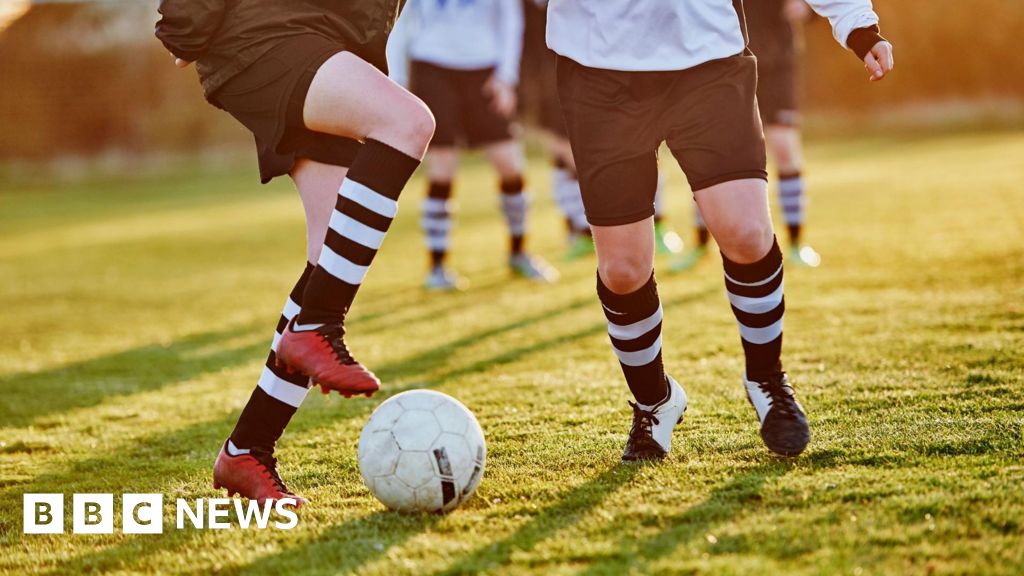NFL
Scottish clubs reported to watchdog for youth football deals

 Getty Images
Getty ImagesScotland’s professional football clubs have been reported to the UK’s competition watchdog over the rules for registering child footballers.
The Competition and Markets Authority (CMA) has been asked to investigate how young players are registered with elite clubs and move between them.
Complaints to the CMA from Scotland’s Children’s Commissioner and grassroots campaigners argue the current system exploits young players and breaks competition law.
The Scottish Football Association (SFA) said significant progress has been made to protect young players involved in the game.
The SFA added its registration system was in line with world governing body Fifa and pointed out it had already amended some of its processes after input from the children’s commissioner.
Children can register for a professional club in Scotland from the age of 10 and a compensation system is in place when young players moves between elite teams.
Players in these teams in the 15 to 17-year-old age group sign for a two-year period that can only be terminated if both parties agree.
It is these rules, along with a cap on moves between clubs, which critics claim are restricting young players’ freedom of movement.
In 2020, Holyrood’s petitions committee raised “genuine concerns” about whether the current registration system adequately protects the rights of children and called for reform.
The SFA has since changed some of its registration rules but Nick Hobbs, head of advice and investigation at the Children and Young People’s Commissioner Scotland, claimed they have not gone far enough.
He said: “The current rules give child footballers less protection, and less control over their own lives, than adult professionals.
“There is a massive power imbalance between them and the clubs they sign for which can amount to economic exploitation – this is a fundamental breach of their human rights.
“We feel that the SFA is effectively failing children, this is something that has needed to change for a very long time now.
“They have not been willing to do it voluntarily so we are hoping they will now be forced to do it.”
 SNS
SNSScott Robertson, co-founder of the Real Grassroots campaign group which brought the 2010 Holyrood petition pushing for changes to the registration system, has also submitted a complaint to the CMA.
He said: “We have seen many examples of our professional clubs parading players as young as ten in front of press stands signing registration forms.
“The kids, and some parents, think it’s the road to riches without being informed of the implications.
“Rather than promote competition and grow our game, these rules have done untold damage to Scottish football. The clubs place their interests and profit margins before kids.”
Rule changes are a ‘no brainer’
 SNS
SNSFootballer Kieran Gibbons has described the push to allow young players more freedom to move between clubs as a “no brainer”.
The 29-year-old, who currently plays for Tranent, but when he was 13, he was registered to one of the SFA’s club academy teams and wanted to leave.
“The training facilities were not the best and didn’t even have changing rooms,” he explained.
“I was travelling a distance and had to come straight from school and had grown tired of this. When the time came to sign on for the following season I asked to leave.”
Kieran said the club “were not happy” but agreed to let him go – though he says unbeknownst to him they held onto the registration.
The player says this only came to light when other senior teams in Scotland invited him for trials and were told by the club he had just left that they would need to pay a £9,000 fee to take over his registration.
He added: “At that time no one was able or willing to pay that for a 13-year-old, who may or may not make it to professional level.”
Kieran says he was then “left in limbo” for more than nine months, retuning to amateur football, before eventually moving to Aberdeen for his first professional contract.
“I was just a kid and I just wanted to play football. There needs to be a change so people in my situation can more easily walk away,” he added.
What are the registration rules?
The vast majority of youth players in Scotland between the ages of ten and 17 sign amateur registration forms which last one season.
For those in the elite youth football teams, which come under the SFA’s Club Academy Scotland (CAS) programme and are run by 11 of the country’s professional clubs, there are different rules.
Players in these teams in the 15 to 17-year-old age group sign for a two-year registration period that can only be terminated if both parties agree.
It is in this period when players are usually offered their first professional contract or released by clubs.
It is also possible to cancel a registration if a player has played in less than 25% of the eligible games or via an appeal to a SFA Young Players Wellbeing Panel.
The movement of young players between CAS clubs can also be subject to compensation to cover training costs when the player signs their first professional contract.
Elite level clubs can only sign one player from a club within the same age group each season.
The SFA has previously said its registration forms are a binding legal document but not a contract, something which campaigners and some lawyers disagree with.
 SNS
SNSWhat can the CMA do?
The CMA is the UK government body responsible for taking action against businesses and individuals that take part in anti-competitive behaviour.
Its role used to be part of the now defunct Office of Fair Trading and it is investigating the sale of Oasis concert tickets using so-called ‘dynamic pricing’.
The CMA will spend the next few months considering the two complaints made against both the SFA and SPFL before deciding if it is going to launch a formal investigation into the claims.
The complaints centre on the argument that the current setup amounts to an anti-competitive ‘no poach’ deal – where clubs effectively agree not to compete to recruit youth players from each other.
The complainants will also argue recent developments, such as the Lassana Diarra and Fifa case, mean players should have more power to move and work where they wish.
If the watchdog concludes there has been an infringement of competition laws it can issue a fine and direct Scotland’s football authorities to modify or cease their registration rules.
The size of any CMA fine depends on the turnover of the business being probed but they can run into tens of millions of pounds.
‘Significant progress’
A spokesperson for the SFA said it had “consulted extensively” on the subject of improving youth football in the near 15 years since the issue first went in front of Holyrood’s petitions committee.
They added: “We were pleased that the report published in 2020 by the public petitions committee acknowledged the significant progress made to protect children and young people involved in our game.
“Since the publication of the report, we have continued to evolve our policies and procedures in line with the Fifa statutes.
“Indeed, we have successfully amended the process of reimbursement of training costs based on input from the children’s commissioner, ensuring training compensation is only due when the player signs their first professional contract.”
The SPFL was approached for comment.











